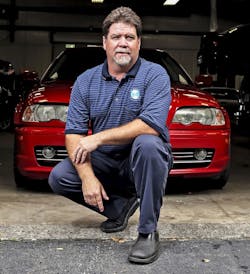For six years, My Mercedes & Bimmer Place in Cumming, Ga., ran smoothly. Danny Brewer had moved his business into a larger building, increased staff, and pushed annual revenue to nearly $2 million.
But Brewer, who was extremely present on the shop floor and often working on vehicles, knew something was off. A technician by nature, Brewer began to see the line between “boss” and “friend,” and how his tight-knit relationships with employees and micromanaging leadership wasn’t allowing his team to reach its full potential.
“I was hanging out and going to the lake with my employees, and I began to realize I couldn’t be disciplinary with them, either,” he says. “I can’t drink beer with you yesterday and then get on your case today.”
Brewer has dedicated more attention to process improvements and employee perks through a new daily schedule: He’s spending less time on the floor and more time in his office, thinking about his business and the little things that make work worth coming to every day.
Focusing on management each and every day has been a learning curve for Brewer, but his attention to leadership is clearly paying off: In the last two years, revenue has grown $500,000 to $2.5 million, and his shop is humming like never before.
I started being more of a “boss” two years ago, which created an overall attitude adjustment. I’m still their friend, but I’m also their boss, and with that comes some semblance of structure. Sometimes that means I’m joking around, and sometimes I need to come out of my office and tell everyone to stop talking and get back to work.
It’s taken a while to get down, but now they get it. I needed to find that balance between co-worker and owner. They’ve all been to my home—they know I live in a regular old house like everyone else. I don’t go out and buy a brand new Mercedes and drive it around and act like the boss. But I also have some things they don’t, like a boat and a lake house, and I don’t throw it in their faces. They know I’ve worked hard to get where I am. Without them I couldn’t have done that, but without me, they couldn’t do what they do either. They can go work for some place that has a lot of rules and regulations and policies, but they like the flexibility I offer. It’s created an atmosphere where we can joke, but we also work really hard.
We open at 8 a.m. Generally my service advisor gets here earlier around 7:20 a.m. and I’m here at 7:30. He starts making breakfast, which is something I started offering my employees a couple years ago so they didn’t have to stop at McDonald’s every morning. It might be bacon, egg and cheese biscuits or a breakfast burrito. They wrap it in a napkin, go out to their bays and get going.
While he’s making breakfast, I start opening gates, turning on lights, opening doors, and making sure the garbages are emptied so we’re presentable for our first customers of the day.
Lately the customers have learned that we really don’t open at 8 o’clock. They don’t see us walking around in here with the doors locked—as soon as we get here, we unlock everything. There’s always someone here at 7:30 if they want to get here earlier and get in line for a waiter oil change. So as of late, my day starts with checking in people who get here early, distributing rental cars to people so they can get on the road.
When my employees roll in, I’ll go out in the shop and chat a little bit, see how everybody’s day was yesterday, see if I’m needed for anything managerial. “Do you need me to do anything? Did something happen yesterday that I need to address? How was your night?”
Every employee will have personal time with me, or at least have the opportunity for personal time. All the way from the receptionist to the top technician in the back.
“I had a big micromanagement problem. I’ve had to learn to let them work through their own issues.”
—Danny Brewer, owner, My Mercedes & Bimmer Place
I used to start my days going out and working on cars, helping my techs with any issues. I had a big micromanagement problem. I’ve had to learn to let them work through their own issues, or have one of my top techs head over and help out. If they get to the point where they’re frustrated and truly can’t figure it out, then I will go out there and see what I can do.
That way, my afternoons can consist of working on implementing ways of improving the culture. I’ve always trained the guys, “If you can do something really simple and don’t even write it down on the repair order and the customers notice, I promise you it’ll be worth your time.” So I introduced these comment cards. We self-address them for the customer and leave them in their cars. It becomes more personal when they can actually write down how they feel about us and send it to the shop. I can actually go out and show the guys, “Look at this nice thing somebody wrote about you.”
A year ago, our back gate was a pain to roll back and forth because the post slipped in the ground. So I rented a backhoe, went out there and dug it all up and put 800 pounds of concrete in it myself. I could have paid someone to do it, but I think it means more to those guys to know that I’m actually going to get off my desk, go out there and actually do it.
Little things like that go a long way. It’s not the same old same old here every week here. Something is always changing. Whether it’s putting a flagpole up or fixing the guys’ lifts or painting the floors, my guys appreciate that extra effort.
Our working hours are from 8 a.m. until 5:29 p.m. We learned that if you close at 5:30, people think you’ll still be there at 5:45. But if you tell them 5:29, they know at 5:30 we’re closed, so my guys aren’t expected to stay late.
As we’re closing up, the service advisor and I will talk about the day and how things went, if he saw anything I need to be aware of. I’m trying to put more responsibility on him. I no longer need to know every little thing that happened or transpired.
That delegation has allowed me to leave work without stress, with a clearer head. My daughter got married a couple weeks ago up in New York, and I was able to leave and not even think about calling here every hour. They actually handled everything flawlessly and I had no issues when I got back. A few years ago, it would take me four days to get caught up. Now I’m right back into my same regimen like I wasn’t even gone. Being able to go eat lunch with my grandkids without worrying is a luxury I didn’t have before—I’m happy to have gotten to this point.



